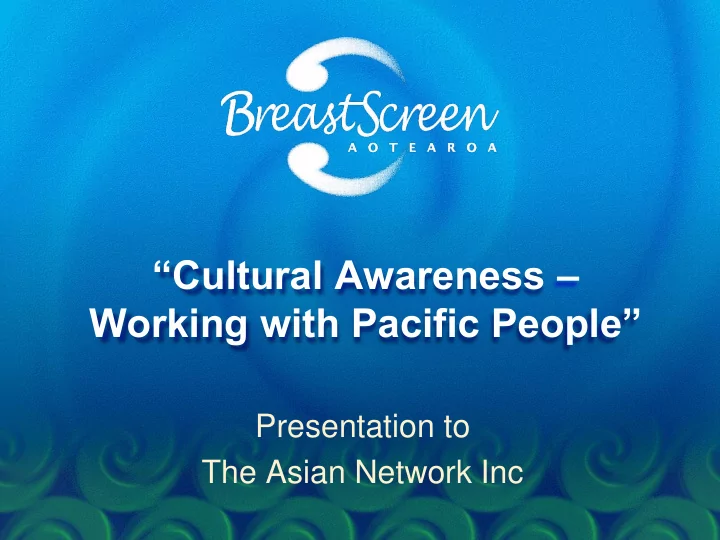

“Cultural Awareness – Working with Pacific People” Presentation to The Asian Network Inc
The National Breast Screening Programme Kia ora, Talofa lava, Malo e lelei, Kia orana, Fakalofa lahi atu, Bula vinaka Talofa lava my name is Miriam Gabriel, Recruitment and Retention advisor for BreastScreen Auckland since 2012. 1 st generation Samoan born in NZ, the eldest daughter of Ioasa and Sina Masoe. My father comes from the village of Asau, Savaii, my mother is from the village of Saleimoa, Upolu, Samoa. My journey of Cultural Awareness took me on a journey getting to know me, my heritage, my cultural and learning to celebrate it. My cultural awareness journey has opened by eyes the rich and diverse cultures in our community , learning through listening, sharing common goals and celebrating our uniqueness together. (Whakapapa is the recitation of genealogies or stories which create a base or foundation of meaning for people. Whakapapa are ways by which people come into relationship with the world, with people, and with life)
The National Breast Screening Programme Collaborative Pasifika partnerships = stronger, healthier, positive and informed Pasifika Communities ADHB has seen the Pacific screening no's achieve well above the 70% target since 2011 Nov-11 Nov-12 Nov-13 Nov-14 Nov-15 81.4 85.5 89.1 88.1 72.4 • This has only been achieved due to support and working collaboratively with passionate people creating a village health network, which strengthened working relationships, a more united voice around family wellbeing (not just our message), teaching cultural awareness, sharing knowledge and resources. Our collaborative partners: HealthStar Pacific, Pacific health promoters network, church networks, community stakeholders, PHO’s, and GP Practices.) • Attending “Cultural Competency” workshops are valuable • Community Networks are a great source of inspirational champions
The National Breast Screening Programme How to build relationships, engage & work with people with different cultures? (A.S.K – Ask,Seek,Knock) • The biggest resource knowledge banks are “People from within the culture group that your trying to reach” they sit beside us, friends, work colleagues, at community networks. Time is always a challenge but think about key questions that you would like answers to: I’m speaking at ……….. What appropriate clothing should I wear? Should I approach it in a more formal presentation (power point, talking from the front) or less formal through open discussions and smaller groups? • You want your message to be understood, so don’t be the distraction NO question is a silly one, making the effort to research on how to engage culturally appropriately, will give you greater confidence when delivering your message • Working collaboratively – with a group/organisation who have worked with the ethnic group that your trying to reach. Or ask the group “what would you like to see” or “what are your needs” and start connecting providers that can support the community eg. Women’s Wellbeing/Hauora Wahine event; we could bring both Cervical/Breast providers together and support services (ISPs Te Ha Oranga or HealthStar Pacific) and interpreters • Don’t Rush your message – Breath, Share and Enjoy
The National Breast Screening Programme • Planning and consultation process ensured Success Stories that delivery was culturally appropriate and in an honouring manner • • Working group: BreastScreen Auckland, Development and launch of BreastScreen Counties Manukau, DVD resource in July 2012 HealthStar Pacific, the Fono, MOH/NSU “Love, Hope, Faith Women of the those within that group had national affiliations, church and community Pacific fight Breast Cancer” connections and they covered a number of Pacific Groups: Samoa, Tonga, Cook Island Maori, Fiji, Nauru, Tokelau, Kiribati and Tuvalu • Since it’s launch the DVD has been shown throughout the Aotearoa, the Pacific Islands, Australia, Alaska and through to • Breast Screening Pacific Health USA Workers identified that there was a real • Supported and funded by NZBCF and the need to create a visual tool which Lions Foundation embraced the various ways Pacific • peoples communicated: spoken Resource is available for FREE on the New (languages are oracle), the unspoken Zealand Breast Cancer Foundation (body language) and written http://www.nzbcf.org.nz/Forms/EducationOr derForm.aspx
The National Breast Screening Programme • Celebrate Living – ProCare • Event held at Wesley Community Recreation Centre • 12 Pacific Churches participated • Celebrate outcomes from ProCare Healthy Village Action Zone (Gardens, exercise program) • Involvement of other health provider stakeholders • Each station was interactive to allow people to engage in conversations • The Opportunity to convert those conversations into registrations
The National Breast Screening Programme • Love hope Faith Walk (Breast Cancer Awareness month 2013) • Working group HealthStar Pacific, BSCM, BSAL supported by Pacific Nurses • Simple Family activity that we could engage in together Low/No cost • Started with prayer for those in treatment, remember those who have passed away. Followed by Zumba, a gentle walked around the Panmure Basin finished with a cuppa tea, koko rice and laughter • Received 82 feedback evaluations achieved, 16 New, 39 Retention, 27 Outside criteria
The National Breast Screening Programme • GP Data Matching Screening Partnership since 2010 • Objective is to increasing breast screening participation • We offer to work alongside practices to data match practice records against BSAL database, identifying eligible patients who are due to have a mammogram • To reduce the administration workload of the practice by Directly contacting and / or enrolling patients in the National Breast Screening Programme • To assist practices reach screening targets • FREE for practices • Call Centre team are able to offer our Pacific women additional support through HealthStar Pacific
Recommend
More recommend